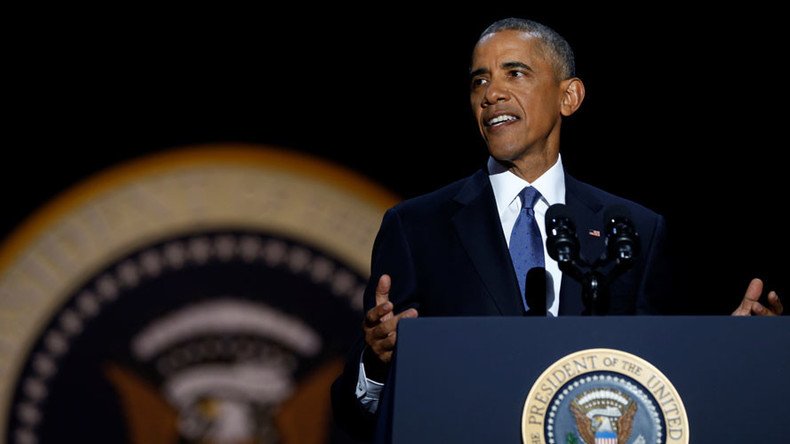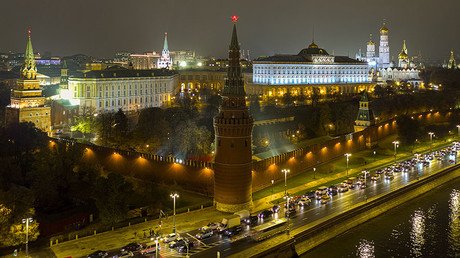‘Under Obama, family median income dropped and Democratic Party imploded’

There was a great opportunity for the Democrats in 2008, but Obama's policies have resulted in the Democratic Party now being on the verge of collapse, journalist Jack Rasmus told RT. Retired US Army GeneralPaul E. Vallely also provided his views,
On Tuesday Barack Obama gave his farewell presidential address in Chicago. He said America is in a "better, stronger place" than when he took office eight years ago. He also seemed hopeful about the future of the US.
RT: How do you think history will judge President Obama's eight years in the White House?
Jack Rasmus: Well, I think his two greatest legacies, and there are a number of them are not that positive. One – on his watch here for the last eight years notwithstanding on the positive things he said about how we’re supposed to be better off than we were eight years ago, which is debatable – the biggest legacy is that certainly the wealthy have recovered very dramatically. Ninety-seven percent of all of the net income gains since 2008 have gone to the wealthiest one percent. Households, at the same time, the middle class, the median family income has continued to decline every year in real terms. I think that is going to be a legacy which is worse than under George W. Bush, and worse than under Clinton.
Any other legacy that people are not talking about is that on his watch, as the head of the Democratic Party, that party has almost imploded: roughly two-thirds of all the state legislatures and governorships are now in the hands of Republicans. Clearly, there was a great opportunity in 2008, and it was the Obama policies that have resulted in the Democratic Party being in such a bad shape. It may not even recover from here going forward. So those two things will be the primary legacies here.
BREAKING: Obama bids farewell to nation from Chicago (Watch Live) https://t.co/jW5EKPkuoUpic.twitter.com/2Ziw2MlyWS
— RT America (@RT_America) 11 января 2017 г.
Also, he kind of governed from Washington. He sat behind the desk. Unlike other presidents you didn’t see him that much on television giving speeches to the nation, trying to rally people around his policies and going out touring the country as other presidents have done to try to rally support.
He stayed in Washington behind the desk there and played it very cautious on a whole number of fronts. We see the result of that. The country is not better off, regardless of what he said. In a whole number of ways it’s worse off, it is more divided. His speech talked about solidarity because clearly, the country is very, very divided. Even his ratings are a little bit higher than they were two years ago. It was just two years ago that they were as bad as George W. Bush in 2008. So they couldn’t get much worse.
RT: Back in 2008, Barack Obama said he would "not waste a minute" in trying to resolve conflicts in the Middle East. Did he live up to that promise?
JR: Clearly, the Iran deal was something of a win, but the whole Middle East is on fire still, and that hasn’t been corrected. We’re still in a 16-year war in Afghanistan with the government their collapsing. We’re still fighting ISIS in Iraq. The foreign policy – we’re dangerously here arming Eastern Europe. The neocons and the US State Department ran amok on his watch in Ukraine and elsewhere, and he put a stake in the ground for a possible future confrontation with China. So foreign policy has not been the best of his records.
#Trump gouges #Obama on #Gitmo as final detainee transfers announced https://t.co/fRu4xeNV8Lpic.twitter.com/q1NLOqNtQe
— RT America (@RT_America) 4 января 2017 г.
'Delusional state of mind'
When you look at the economics, you look at the Middle East, you look at all the failures that we’ve had from a foreign policy standpoint, his presidency will go down as a failure, says Paul E. Vallely, retired US Army General.
RT: How do you think history will judge President Obama's eight years in the White House?
Paul E Vallely: … I think the legacy will be that he has had a failure as a president over eight years. Many things are not as he explains it – I guess sort of living in what we call a delusional state of mind, not looking at the reality of the world. When you look at the economics, you look at the Middle East, you look at all the failures that we’ve had from a foreign policy standpoint, his presidency will go down as a failure in my opinion.
RT: In his speech, Obama said: “No foreign terrorist organization has successfully planned and executed an attack on our homeland these past eight years." Do you think he has succeeded in reducing the terror threat?
PV: No, it is actually increased not only in the US and coming across to our borders and radicalizing a lot of - what we might call immigrants who have come into this country - plus others who have become a terror threat unto its own in our cities and in our neighborhoods. When you look at what’s happened in Europe, and throughout even the Middle East and Turkey, we’ve had an increase in radical Islamic terrorism. So it is not true that we’re better off than we were before. We’re actually under a bigger threat than ever.
RT: Do you think that is because of US foreign policy? Yesterday the director of the CIA said that the Obama administration made a mistake when it hoped to impose Western values and Western-style democracy in the Middle East during the Arab Spring. Do you think there is a link between foreign policy and the issues that you’ve just raised?
PV: Sure there is. When we look back, Iraq was never a real threat to the US. They were economically really in bad shape. So when Bush went into Iraq and Afghanistan, they attempted to do nation building, basically trying to bring some kind of democracy to those countries and cultures, which was really counter to Islam and Sharia law, and it would never have worked.
It was very naïve for our leaders to think we could go into the Middle East and make them into democracies. As we well know, democracy has to grow from within, not from without. This has been a very big issue in the US. Our foreign policy has not been well-thought out with vision and strategy that we need to have in order to help countries, not to get in and cause chaos and disturbance.
There has not been a smooth transition [of power] as he had with President [George W.] Bush. There’s been constant fake news put in the media and spread by broadcasting networks like CNN… this has created a lot of disturbances. But listen. President-elect Trump and his new cabinet, staff and transition team, they’re above it all. And they’re not stooping down to believe that any of this is going to have any effect on our new president in 10 days. It’s going to be a whole new different American that we’re going to see here.
The statements, views and opinions expressed in this column are solely those of the author and do not necessarily represent those of RT.













